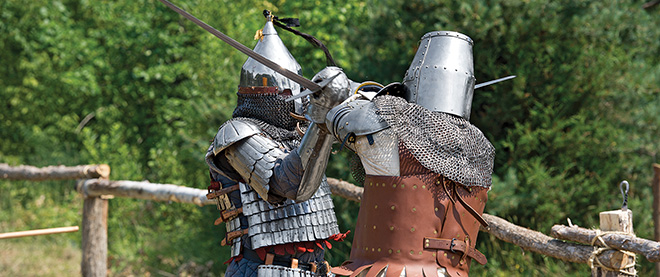Ye olde separatists
Efforts to forge a national team to compete in medieval tournaments meet resistance in Quebec
Photograph by Cole Garside
Share

Each spring for the past few years, approximately 200 of the world’s most dedicated enthusiasts of medieval historical re-enactment meet in a small eastern European town to represent their respective countries in the Battle of the Nations, what is essentially the Olympics of modern-day medieval combat. Teams compete in full armour, with metal weapons forged to resemble those from their favourite time period (weapons are blunted to prevent injury). Competitions range in scale from one-on-one combat to “all-on-all,” a category in which fighters of every nationality present storm the battlefield at exactly the same time. Twelve nations participated in the tournament this year. Canada wasn’t one of them. Quebec, however, was.
Team Quebec—or Ost de Quebec as it’s officially called (rough translation: “the army of Quebec”) has competed at the Battle of the Nations since its inception in 2010. Log onto the competition website, look up at the masthead—a banner of flags—and you’ll see the fleur-de-lis nestled between the emblems of Belarus and Italy. But no maple leaf. “I represent Quebec before I represent Canada,” says 29-year-old Quebecois medievalist Marc-André Dubois. “That’s the way I see it, and most people on our team see it the same way.”
Canada proper has never had a team compete in the Battle of the Nations. That may soon change. The Scallagrims, a group of medieval recreationalists in Toronto, has been quietly—albeit unsuccessfully—trying to recruit Ost de Quebec onto a unified Canadian team; one that would, in the words of the group’s director of medieval warfare, Sasha Grybyuk, “kick ass at the international level.” Grybyuk, 28, is an IT analyst when he isn’t passing as a warrior from the 13th century. He’s also optimistic that one day Canada will present a united front at the Battle of the Nations. “In medieval times there was politics, and here there is politics,” he says. “Eventually, hopefully, Quebec will get merged with us.” If not, they are prepared to form a Team Canada irrespective of Quebec. Scallagrims costume director Alexandra Nestertchouk admits her team has “even started learning French to communicate” with the Quebec team. (Nestertchouk’s tournament costume includes a purse she made entirely from a fox’s hide. “I killed it, I skinned it, I ate it,” she says.)
There has been some measure of detente. This past February, the Scallagrims and Ost de Quebec banded together to create the National Medieval League, a Canada-wide, non-profit, historical medieval combat organization. Their membership consists mainly of Ontario and Quebecois fighters at the moment, though they “do have some Vikings in B.C.,” says Nestertchouk. Their most recent event, Sword and Fire, was held on July 13, at a Waubashene, Ont., campground. It was organized by the Scallagrims—an attempt to attract Ost de Quebec “to team up as one Canadian team.” Unfortunately, Team Quebec announced they couldn’t make it due to a scheduling conflict. There were no hard feelings though; the separatist streak that runs through the Quebecois squad isn’t a personal one. Ost-de-Quebec coordinator Annie Desjardins says her team genuinely likes its Ontarian competitors, and would even consider recruiting some of them onto the Quebec team for Battle of the Nations. They just won’t join Team Canada, or be a part of its formation. “Our team captain is a very strong believer that Quebec is a separate nation,” she says.
The conflict isn’t entirely political; it’s cultural too. Historical reenactment of any kind is about accuracy: bringing a time and place to life as vividly and accurately as possible. When Ost de Quebec competes, they are French warriors from the 15th century. When the Scallagrims compete, they are Druzhina, 12th- and 13th-century eastern European fighters (the Scallagrims team is of predominantly eastern European descent). Joining together would literally be a clash of cultures, and culture is a touchy subject for people devoted to historical re-enactment. On the other hand, not merging can be fraught, too, no matter how civil the trappings. “In the future,” says Dubois, “the Quebec team will continue. If Canada puts together a team for the next Battle of the Nations, it will be our pleasure to do battle with them.”